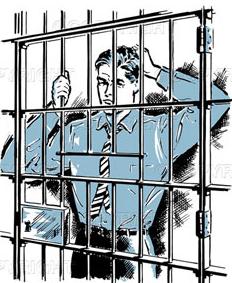Sentence
Conrad Black is sentenced to 6½ years in jail – after festive season is over
 Lord Black of Crossharbour was sentenced to 6½ years in prison in the US yesterday for stealing millions from the newspaper empire that he built.
Lord Black of Crossharbour was sentenced to 6½ years in prison in the US yesterday for stealing millions from the newspaper empire that he built.
The fallen press baron, who once controlled the third-largest newspaper group in the world, was ordered to start his sentence on March 3. The judge recommended that he serves his term at Eglin Air Force base in Florida.
The 63-year-old former Telegraph chairman stood and briefly addressed the judge, nervously tapping his fingertips on the podium, but refused to apologise for his crimes. “We have the verdicts we have and we can’t retry the case,” he said.
But he did voice his sorrow at the near-collapse of the company that he founded. “I would wish to express very profound regret and sadness at the severe hardship inflicted on all the shareholders, including many employees.”
Black’s second wife, the columnist Barbara Amiel, and his daughter Alana watched from the front row of the public gallery. The sentence for fraud and obstruction was far shorter than the 24-30 years sought by prosecutors. The relatively short term means that Black will not have to forfeit his oceanfront mansion in Palm Beach, Florida.
Friends said that the usually loquacious Black had been advised by his lawyers not to speak in case he antagonised the judge. But he thanked Judge Amy St Eve for her courtesy.
His lawyer, Jeffrey Steinback, told the judge that Black respected the jury’s verdict but did not agree with it and would not apologise to the court. “If I could convince him to say such things, they would only ring hollow,” he said. “They would show Conrad to be a broken man. Perhaps some would then think of him as a criminal.”.
Defending Black’s recent defiant interview on the Radio 4 Today programme, in which he protested his innocence, the lawyer complained that the interviewer, John Humphrys, had “chided him, baited him, attacked him, goaded him”.
Eric Sussman, the prosecutor, countered: “Mr Black has refused to acknowledge that what brought him here today is his greed and his own disdain for the rule of law.” Mr Sussman challenged the defence claim that Black was a do-gooder who had contributed to the Aids charity run by Sir Elton John — one of more than a hundred people who sent character testimonials to the judge. He said that the £5,000 contribution came from Telegraph funds. “When Mr Black was asked to go into his own pockets, he said ‘no’,” Mr Sussman said.
Judge St Eve refused, out of “fundamental fairness”, to apply tougher sentencing guidelines for financial fraud that were established in the wake of the Enron scandal and came into force after Black’s crime. She also agreed with a pre-sentence report by a probation officer that said the fraud for which Black was convicted totalled $6.1 million (£3 million), rather than the $32 million claimed by the prosecution. But she added: “I do not find Mr Black has totally accepted responsibility for the offence.”
Because he is not an American, Black cannot qualify for a minimum-security prison camp. He will also be denied the right to spend the final six months of his sentence in a halfway-house, and he will be transferred to an immigration holding pen when his sentence is complete, pending deportation.
A British national who relinquished his Canadian citizenship to enter the House of Lords, Black can ask to serve his time in a British jail. But he has said that he has given no thought to seeking such a transfer. Friends say that he believes that prosecutors will not give their consent.
Black will be held in a low-security prison, sharing a dormitory with drug offenders and child pornographers. “He is in for a tough time,” said Herb Hoelter, a sentencing consultant at the National Centre on Institutions and Alternatives. “One aspect is psychological. You were the CEO and now you are taking orders from a corrections officer who, but for the prison, would be a dairy farmer. It’s an extreme adjustment.”
Black has been free on $21 million bail since his conviction in July on three counts of fraud and on a charge of obstruction of justice. A famously late riser, he will have to be standing by his bunk for the morning head count at 6.15am. After breakfast, he will report to a prison job paying 12 cents an hour that could range from swabbing the floors to teaching inmates who are studying for their high school diplomas.
Black has said he will write an “authoritative” account of his ordeal. In a court filing, he has already revealed that both his sons suffered health problems linked to the stress of the case.
He will receive up to 300 minutes a month of telephone time to talk to friends and family, and frequent visiting hours, but no “conjugal visits”. Inmates can spend up to $275 a month on clothing, food, sweets and even radios in the prison commissary.
Tycoon's decline and fall
August 2002 Barbara Amiel, Conrad Black’s wife, below, shows off her vast wardrobe and hundreds of pairs of shoes in an eight-page spread in Vogue
November 2003 Criticised by shareholders, Black resigns as chief executive of Hollinger International
September 2004 A committee of Hollinger International concludes that he spent millions of the company’s money funding his lavish lifestyle
September 2005 Black’s longstanding business partner, David Radler, pleads guilty to fraud and offers to testify against his former colleague, who is indicted for fraud and racketeering in the Chicago Federal Court.
(Published by Times Online, December 11, 2007)
_____________________